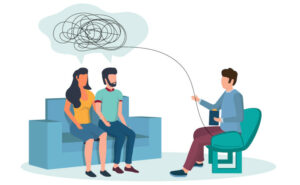In today’s fast-paced world, relationships can often face challenges. Whether you’re dating, engaged, married, or in any kind of interpersonal connection, you may encounter issues that leave you feeling overwhelmed or disconnected. This is where a relationship psychologist comes into play. But what exactly is their role, and how can they help you? In this blog, we will explore the steps on how to consult a relationship psychologist, whether you’re facing difficulties in your partnership or simply want to strengthen your bond.
Contents
What Is a Relationship Psychologist?
A relationship psychologist, also known as a couples therapist or marriage therapist, is a licensed mental health professional who specializes in working with individuals and couples to improve the quality of their interpersonal relationships.
They employ various therapeutic techniques to address communication problems, trust issues, intimacy challenges, and more. These experts play a crucial role in enhancing the quality of relationships. These professionals have training and expertise in addressing various issues and challenges that can arise in personal relationships
The Importance of Relationship Psychologists

Relationship psychologists play a crucial role in helping individuals and couples navigate the complexities of their interpersonal relationships. Their expertise and guidance are invaluable for several reasons:
- Improving Communication: Effective communication is the cornerstone of a healthy relationship. Relationship psychologists help clients learn how to express themselves openly and listen actively, reducing misunderstandings and conflicts.
- Conflict Resolution: Conflict is a natural part of any relationship, but it can escalate if not addressed constructively. Psychologists teach couples how to manage conflicts, find compromises, and work through disagreements in a healthy manner.
- Rebuilding Trust: Trust is fundamental in any relationship. Psychologists assist individuals and couples in rebuilding trust after it has been damaged due to issues like infidelity or betrayal.
- Enhancing Intimacy: Emotional and physical intimacy are essential components of a satisfying relationship. Psychologists help couples address issues related to intimacy, fostering a deeper connection and closeness.
- Strengthening Bonds: Relationship psychologists provide tools and strategies to strengthen emotional bonds, creating a sense of security and support within the relationship.
- Preventing Divorce or Separation: For couples facing serious challenges, psychologists can help explore options for reconciliation and prevent divorce or separation. Their intervention can save relationships that may otherwise dissolve.
- Providing a Safe Space: Psychologists create a safe and non-judgmental space where individuals and couples can openly discuss their concerns, fears, and desires without fear of criticism.
- Enhancing Self-Awareness: Clients gain self-awareness, helping them understand their own needs, triggers, and patterns of behavior. This self-awareness is crucial for personal growth and relationship improvement.
When Should You Consider a Relationship Psychologist?

Consider seeking the assistance of a relationship psychologist or couples therapist when you encounter challenges or issues in your relationship that you find difficult to address on your own. Here are some signs and situations when you should consider consulting a relationship psychologist:
- Communication Breakdown: If you and your partner struggle to communicate effectively, leading to misunderstandings, arguments, or feelings of being unheard, a relationship psychologist can help you develop better communication skills.
- Frequent Conflicts: If you find yourselves frequently arguing or having conflicts that remain unresolved, a psychologist can help you identify the underlying issues and work toward resolution.
- Loss of Emotional Connection: When you sense a decline in emotional intimacy, closeness, or affection in your relationship, a therapist can assist you in rebuilding emotional bonds.
- Trust Issues: Trust issues, whether due to past betrayals, jealousy, or insecurity, can erode the foundation of a relationship. Psychologists can guide you in rebuilding trust and addressing trust-related issues.
- Lack of Intimacy: If you’re experiencing challenges related to physical or emotional intimacy, a therapist can help you explore these issues and work toward a more satisfying and fulfilling connection.
- Infidelity: Coping with infidelity can be immensely challenging. Relationship psychologists can support both partners in addressing the aftermath, rebuilding trust, and deciding on the future of the relationship.
- Pre-Marital or Pre-Commitment Counseling: If you’re planning to get married or commit to a long-term partnership, pre-marital or pre-commitment counseling can help you explore important topics, set expectations, and strengthen your relationship foundation.
- Parenting Challenges: The arrival of children can bring new challenges to a relationship. Couples therapy can help you navigate parenting conflicts, establish effective co-parenting strategies, and maintain a strong partnership.
The Role of a Relationship Psychologist
A mental health psychologist is a highly trained and compassionate professional dedicated to helping individuals manage their emotional, psychological, and behavioral challenges. Here are some key aspects of their role:
- Assessment and Diagnosis: Psychologists conduct thorough assessments to understand their clients’ mental and emotional state. They use standardized tools, interviews, and observations to diagnose mental health disorders accurately.
- Treatment Planning: Once a diagnosis is made, psychologists develop personalized treatment plans. These may include various therapeutic approaches, such as psychotherapy, medication management, or a combination of both.
- Psychotherapy: Psychologists provide psychotherapy, commonly known as talk therapy, to help clients manage their symptoms, improve coping skills, and make positive behavioral changes. They use various therapeutic modalities like Cognitive-Behavioral Therapy (CBT), Dialectical Behavior Therapy (DBT), and more.
- Crisis Intervention: Psychologists are equipped to provide immediate support and intervention during emergencies or acute mental health crises. This includes suicide prevention and helping individuals in crisis connect with appropriate resources.
- Education and Psychoeducation: They educate clients about their conditions, treatment options, and strategies for managing their mental health. Psychologists also engage in psychoeducation to reduce stigma and increase awareness about mental health issues.
- Prevention and Early Intervention: Psychologists work on prevention and early intervention programs to identify and address mental health issues before they become severe. This may involve working in schools, workplaces, or community settings.
- Research and Assessment: Some psychologists engage in research to advance the understanding of mental health disorders, treatment methods, and prevention strategies. They also assess the effectiveness of interventions and programs.
- Collaboration: Psychologists collaborate with other healthcare professionals, including psychiatrists, social workers, counselors, and medical doctors, to provide comprehensive care to clients with mental health concerns.
What to Expect in Your First Session with a Relationship Psychologist?

Your first session with a relationship psychologist or couples therapist, often referred to as the initial assessment or intake session, is an important step in starting the therapeutic process. Here’s what you can generally expect during your first session:
- Warm Welcome: The therapist will greet you and your partner (if applicable) warmly and create a comfortable, non-judgmental environment.
- Introduction: The therapist will introduce themselves, providing their name, qualifications, and a brief overview of the therapy process.
- Confidentiality: You will receive information about confidentiality and the limits to confidentiality. Therapists are required to keep your discussions confidential, but there are exceptions, such as when there’s a risk of harm to yourself or others.
- Informed Consent: The therapist will explain the therapeutic process, including their approach, the goals of therapy, and what you can expect in terms of session frequency and duration. You will be asked to provide informed consent to participate in therapy.
- Assessment and Information Gathering: The therapist will ask questions to gather information about your relationship, including its history, the nature of the issues you’re facing, and your goals for therapy. They may inquire about the duration of the relationship, any previous therapy experiences, and other relevant details.
- Setting Goals: You and your partner, if present, will have an opportunity to discuss your goals for therapy. These could include improving communication, resolving conflicts, rebuilding trust, or achieving other specific objectives.
Conclusion
In a world filled with relationship challenges, relationship psychologists serve as guiding lights. They offer valuable support and strategies to help couples overcome obstacles, rediscover their connection, and build stronger bonds. Don’t hesitate to seek their assistance when your relationship needs nurturing and growth.
Overall, mental health psychologists and relationship psychologists play vital roles in supporting individuals and couples on their journeys to mental well-being and healthier, more fulfilling relationships. Seeking their assistance is a proactive step toward personal growth, improved mental health, and stronger, more satisfying connections with others.
A psychologist is a professional who specializes in the study of human behavior and mental processes. If you have any queries regarding online therapy experienced therapists at TherapyMantra can help: Book a trial Online therapy session.


